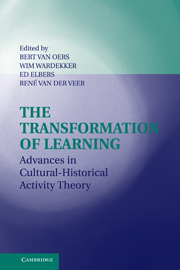Book contents
1 - Learning and Learning Theory from a Cultural-Historical Point of View
Published online by Cambridge University Press: 25 August 2009
Summary
CULTURAL EVOLUTION AND THE TRANSFORMATION OF LEARNING
Over the past century, social scientists have become increasingly sensitive to the cultural nature of human development. The human mind especially has been gradually acknowledged as a contextualised phenomenon, leading to the concept of the social mind. In their historical overview, van der Veer and Valsiner (2000) have demonstrated that this notion of “the social mind” has various roots that go back into the history of European thinking of (at least) the nineteenth century. The works of Vygotsky, Lurija, and Leont'ev on the cultural historical theory of human development, as well as Dewey's work on thinking and education, have played significant roles in the development of this point of view. Still, many scholars in psychology, education, anthropology, and sociology oriented to the cultural-historical (or sociocultural) tradition are putting much effort into elaborating this point of view and discovering its dynamics and mechanisms.
There is much consensus nowadays that culture influences the content and course of development and learning. Rogoff (2003, pp. 3–4) has specified the relationship between culture and development: “People develop as participants in cultural communities. Their development can be understood only in the light of the cultural practices and circumstances of their communities – which also change.” Communities are defined as “groups of people who have some common and continuing organization, values, understanding, history and practices” (p. 80). From this point of view, Rogoff demonstrates that human behaviour and habits vary considerably among cultural communities and between historical periods.
- Type
- Chapter
- Information
- The Transformation of LearningAdvances in Cultural-Historical Activity Theory, pp. 3 - 12Publisher: Cambridge University PressPrint publication year: 2008
References
- 9
- Cited by



